Sensi Today
Newsletter n°03
THE DRYING PROCESS
The drying process at the Sensi company
An interview to Professor Fabio Mencarelli
Professor of Oenology at the University of Tuscia, Department for the Innovation of Biological, Agrifood and Forestry Systems, degree course in Food and Wine-making Technologies, specialization in Vine-growing and Oenology, manager of the winery and experimental vineyard, for years known as the leading international expert in the grape dehydration technology in wine production.
How did the idea and decision to dry grapes come to light?
This was the direction that we decided to take to produce a Governo wine produced with care to achieve excellence. We didn’t say: let’s dry the grapes, then let’s make the wine and see what happens. We are in the land of Galileo; thus, we had to adopt the inductive method: we asked ourselves, we questioned ourselves: where could we place the grapes so that they can lose water without deteriorating? In which building? How should this building be made? Where should the windows be located? Should we place the grapes on crates, on trellis or hanging? Do we adopt the technology in full or do we respect the tradition but do so rationally and with careful monitoring?
And how did you go about it?
We selected a traditional building, a « fruttaia » (fruit cellar) and we decided to place the grapes hanging paying particular attention to closing and opening the windows and the use of fans. We performed continuous monitoring of temperature, relative humidity and air flow speed, always hoping that the weather would help us in this beautiful adventure.
At what stage are you?
As they say in English: it’s a work in progress. For now, we just got started, but with the intention to improve in the management of the dehydration to modulate the synthesis of compounds of interest for the wine. Even in wine-making we decided to take a daring approach. In the traditional system, and in the one we will actually use, dried grapes are added to the starting wine. However, we were curious to try a different approach, working with carefully dried grapes: pressing the grapes and adding the must of the dried grapes to the starting wine or again producing the dry wine from the dried grapes, to be combined with the starting wine. It’s a work in progress.
Finally, the ageing of the wine…
It would have been too simple to use only barriques, so, since we love to challenge ourselves, with the support of a wine-expert, Mr. Landi, we decided to try ageing in clay jars to measure their permeability, understanding their effect on phenolic compounds and on wine aromas, already quite complex since it is a GOVERNATO. We wanted to find out more, given that the scientific literature of reference lacked information. It’s a work in progress. By now, we’re in the midst of this « game », but it is a rational one, a well thought out one, a chess game between ourselves and the grapes and then the wine. We hope to be the ones who will say: « checkmate ».
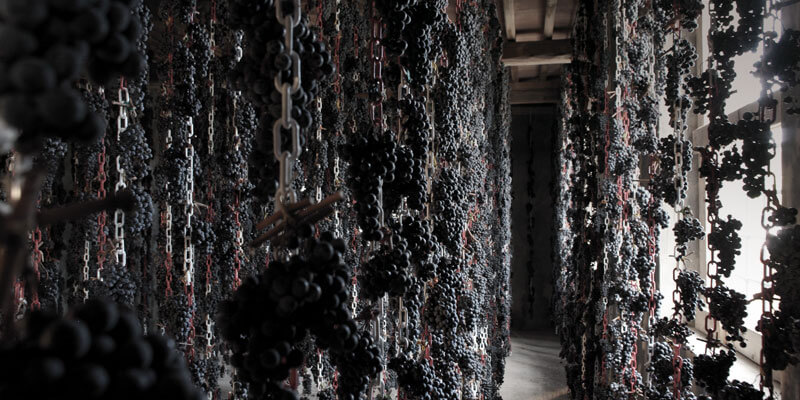
EXCELLENCE 2017
Excellence 2017: many stars for Sensi wines pairings
The V edition of « Excellence » closed successfully also in 2017; an edition that featured a full array of super-chefs. Many Cooking Shows but also many Kitchen Dialogs, talk shows dedicated to chefs who were ready to face the hot topics of the Food & Wine world. Sensi, one of the companies participating to the event, had the chance to let visitors taste its wines as part of the event, but even more importantly, to pair them with the dishes of the Cooking Shows of many Italian starred-chefs. Here’s the event menu, with a few suggestions for an excellent pairing.
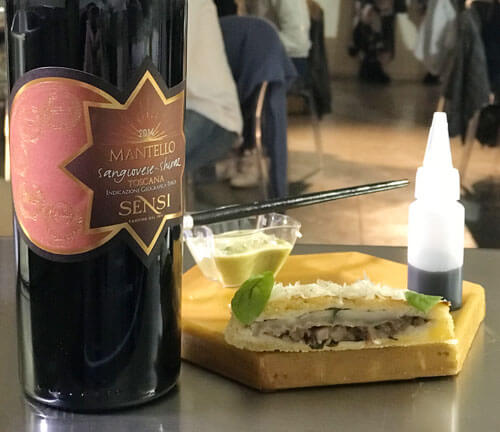
On Saturday, it was the turn of the dishes created by Gianluca Renzi, Chef of Castello di Fighine Restaurant (1 Michelin star), and Alessandro Narducci, Chef of Acquolina (1 Michelin star). The first was a student of Heinz Beck, the second of Angelo Troiani, two among the most renowned and successful Chefs in Rome. Sandwich Romano is an unusual « four-handed » recipe, where tripe, mushrooms and chestnuts represent the heart of the dish. An « edible canvas » dish that diners had to paint with the ingredients and to pair with Mantello, a combination between Sangiovese and Shiraz with hints of spices and vanilla, wild berries and tobacco, which completed the Chefs’ masterpiece.
On Sunday, instead, the pairing was green all the way. The Chef was a master of carbonara, Davide del Duca from Osteria Fernanda in Rome, who, this year at Excellence signed the dish that was a symbol for the event, represented by four images at the entrance of the Tirso Events Space. It was a celeriac recipe, which thanks to a complex smoking and vacuum cooking process, gave to the celeriac the flavor of a piece of meat instead of that of a vegetable. Thus, the perfect pairing was Vegante, a Superior Chianti, both vegan and organic. A no animal by-products approach, thus not even in the wine, just an elegant Sangiovese born from a green philosophy that cares for ecology and environmental impact. The Vegan Quality symbol certifies the integrity of the ethical process according to which this wine is produced.
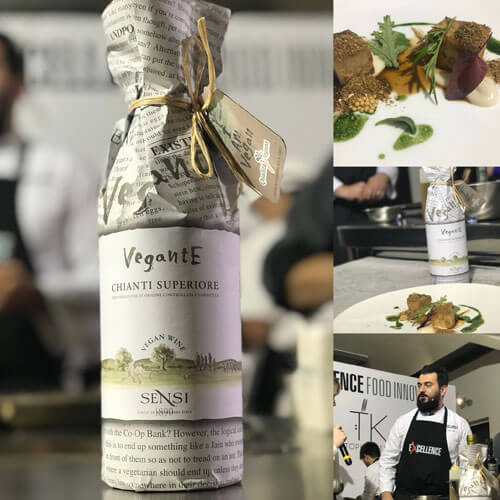
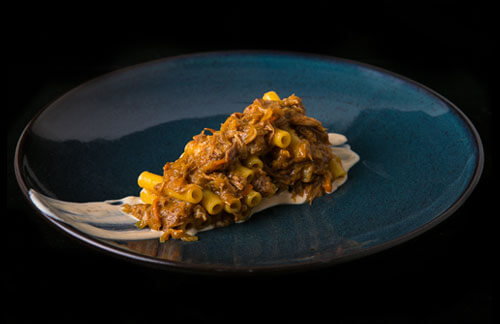
Monday was the last day of the event and featured two additional Michelin-starred chefs: Luigi Nastri from Stazione di Posta in Rome (1 Michelin star) and Peppe Guida from Antica Osteria Nonna Rosa in Vico Equense (1 Michelin star). The dish was a Pasta with Genovese sauce to which the pairing of Governato not only compared favorably with the persistence of the dish but also accompanied it till the end in a perfect pairing. The reason for this success is due to the technique used to create Governato Toscano, thanks to the drying of a portion of the best grapes, which makes this 2016 wine ready, enveloping and full-bodied, capable to withstand and support such a rich traditional dish.
CURRENT NEWS
Organic products, genetics and sustainability
From the Merano Wine Fest to the organic wine producers; these are the days in which the discussion is about corporate sustainability and cisgenic approach.
From 2015 to 2016, the world of certified organic products experienced incredible growth; the sales of organic wine in Large Scale Retail Outlets increased by 19.7% in one year (Nielsen data on sales trend). This makes us think that in the near future, more and more cultivations will be organic or that, anyway, the trend will be towards cultivations that limit the use of synthetic products and towards always more eco-sustainable companies.
This topic was at the core of the debate held a few days ago at the start of the Merano Wine Fest, during the presentation of the new section, « Naturae ET Purae » including the organic, bio-energy, bio-dynamic, natural, orange, ecological sectors and free from wine and PIWI wines (an acronym for pilzwiderstandfahig), that is vines obtained from the crossings of fungal-resistant vines.
The latter are part of an innovative discipline called « cisgenic approach » that has the advantage, respect to the traditional approach, to improve the species since it can provide new varieties of cultivations faster and at a fraction of the cost. However, the opinion leaders present at Naturae ET Purae, who adopted a « green » wine-making approach stated their disagreement [towards the technique], since they are convinced that it may not only be risky, but also that these interventions — even if they were just about speeding up the natural selection process of resistant plants — would represent a departure from the philosophy that they have adopted.
« Opposition to genetic improvement concerns specifically the vine for its symbolic meanings and the strength of tradition expressed by wine » says Attilio Scienza, one of the major experts of wine-making and oenology in the world and teacher at the University of Milan, who participated to the debate.
Overall, during the event, organic wine makers preferred to distance themselves from the concept of « PIWI vines » and instead approach concepts such as new and safer regulatory frameworks offered by stricter inspections, the improvement of organic cultivations with the replacement of copper and sulfur with other, even less damaging, substances and the eco-sustainability of companies through the application of solar panels and other resources to make companies self-sufficient energy-wise and reduce polluting emissions in the environment.
« Sensi vini is planning to install more than 3000 square meters of solar panels to make the company greener, » stated Massimo Sensi. « This is because being sustainable and producing quality wines with latest generation technologies is possible ».
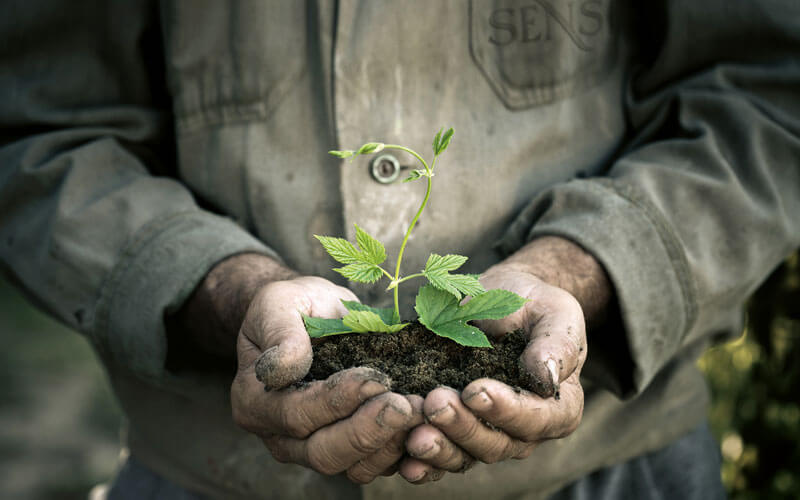
THE WINE OF THE MONTH
Governato
TOSCANA ROSSO IGT
Featuring an intense ruby color, it opens up on typical notes of sweet fruit, cherries and marasca cherries. It is soft and fresh to the palate, characterized by both natural ripeness and sweetness that are the unique characteristics of the Governo Toscano grapes used to produce it. Governato scored 96 points in Luca Maroni’s « Yearbook of Best Italian Wine » 2018.
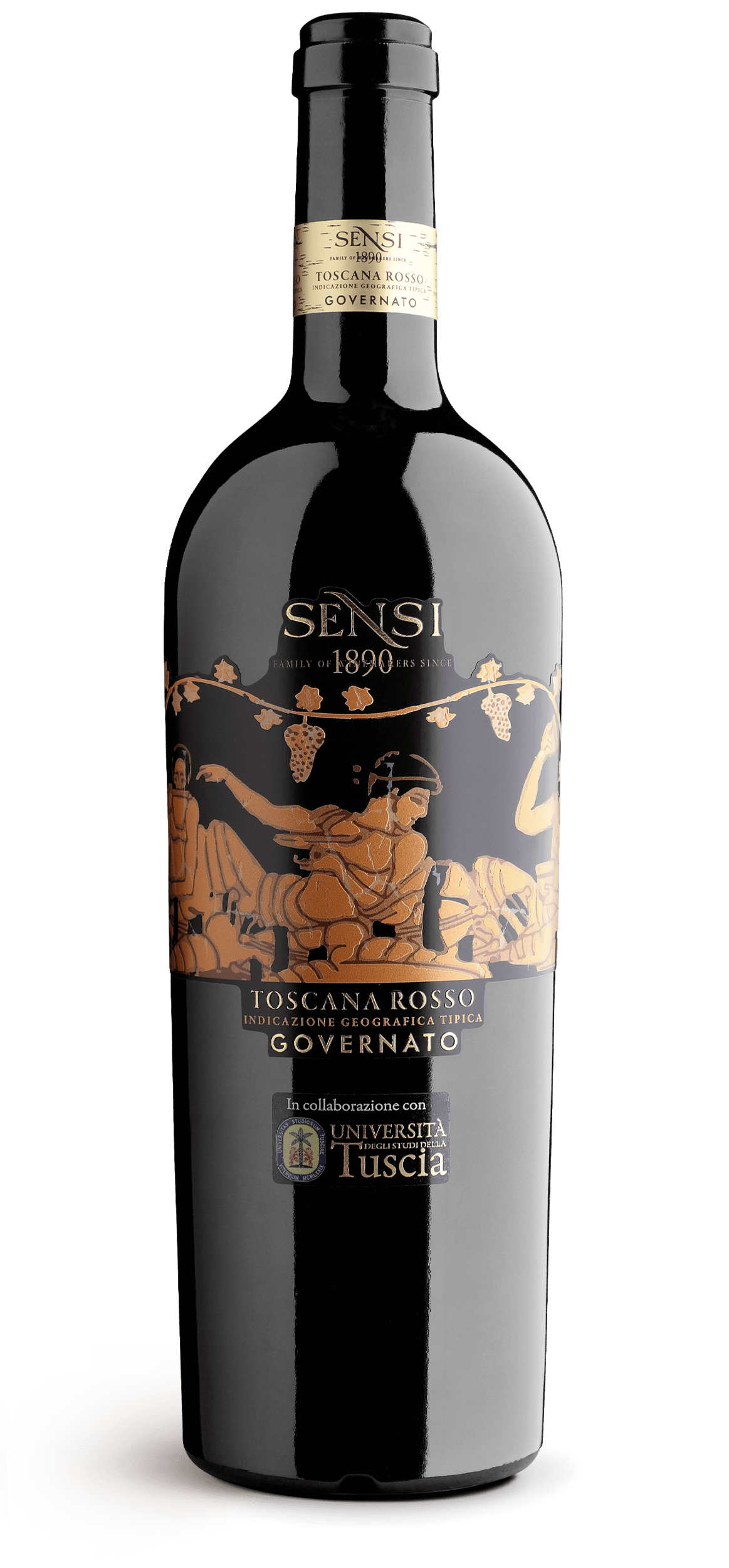
Browse our wines
NEWSLETTER
Subscribe to our newsletter
Sensi Today is Sensi’s newsletter to stay always updated on events, activities and everything related to the Sensi world. Subscribe now!


